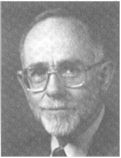Bernard Widrow: Difference between revisions
(New page: thumb|left == Bernard Widrow == Bernard (Bernie) Widrow was born on December 24, 1929 in Norwich, Connecticut. As a graduate student, Bernie was a research assista...) |
m (Text replace - "[[Category:Computers and information processing" to "[[Category:Computing and electronics") |
||
| (3 intermediate revisions by the same user not shown) | |||
| Line 1: | Line 1: | ||
== Biography == | |||
[[Image:Widrow.jpg|thumb|right]] | |||
Bernard (Bernie) Widrow was born on December 24, 1929 in Norwich, Connecticut. | Bernard (Bernie) Widrow was born on December 24, 1929 in Norwich, Connecticut. | ||
| Line 21: | Line 21: | ||
Bernie Widrow is one of those individuals for whom many colleagues have both respect and affection. His insight, creativity, and interest in others have had and continue to have large impacts on the communications profession and the world's communications infrastructure. | Bernie Widrow is one of those individuals for whom many colleagues have both respect and affection. His insight, creativity, and interest in others have had and continue to have large impacts on the communications profession and the world's communications infrastructure. | ||
Dr. Widrow won the 1986 IEEE Alexander Graham Bell Medal "For fundamental contributions to adaptive filtering, adaptive noise and echo cancellation, and adaptive antennas." | Dr. Widrow won the 1986 [[IEEE Alexander Graham Bell Medal History|IEEE Alexander Graham Bell Medal]] "For fundamental contributions to adaptive filtering, adaptive noise and echo cancellation, and adaptive antennas." | ||
See also: [[Oral-History:Bernard Widrow|Bernard Widrow Oral History]] | See also: [[Oral-History:Bernard Widrow|Bernard Widrow Oral History]] | ||
[[Category: | [[Category:Computing and electronics|Widrow]] [[Category:Information theory|Widrow]] [[Category:Memory|Widrow]] [[Category:Magnetic memory|Widrow]] | ||
[[Category: | |||
[[Category: | |||
[[Category: | |||
Revision as of 15:57, 22 July 2014
Biography
Bernard (Bernie) Widrow was born on December 24, 1929 in Norwich, Connecticut.
As a graduate student, Bernie was a research assistant in the MIT Digital Computer Lab which ultimately became a founding division of Lincoln Lab. There he worked on some of the earliest magnetic core memory systems and, together with Professor Bill Linvill, on the theory of sampled data systems. His doctoral thesis was an analysis of roundoff noise in digital systems.
After finishing doctoral studies, Bernie became an Assistant Professor in the MIT Electrical Engineering Department. At that time he was intrigued by the ideas of Marvin Minsky and John McCarthy, the principal architects of artificial intelligence. The idea of building a machine that would have brain-like capabilities was irresistible. He spent six months thinking about what thinking is about. He came to the conclusion that artificial intelligence was not a good field for a new Assistant Professor in the Engineering Department.
Getting results would take too many years. Such work would be better for someone established and tenured. He chose instead to work on something related to artificial intelligence, but much simpler and more tangible. The subject was adaptive filters and adaptive pattern recognition systems.
It was his work in this area that resulted in his famous Least Mean Square (LMS) algorithm. This algorithm automatically adapts a tapped delay line filter, driving its tap weight parameters to values corresponding to minimum mean squared error between the filter output and something it is trying to match or cancel. The applications have been endless and of considerable economic importance. They include adaptive channel equalization for data transmission through distorted channels, adaptive noise cancellation to clean up weak signals buried in heavy interference in medical and other applications, adaptive directional antennas, and echo cancellation in voice and data communications. The success of the coming great transition to the Integrated Services Digital Network depends to a large extent on adaptive echo cancellation in subscriber lines.
In 1959, he joined the Stanford faculty, where he is now Professor of Electrical Engineering. More than 50 students have completed their Ph.D. studies under his supervision. They are scattered all over the country and overseas, in industry and universities. Bernie keeps in close contact with most of them.
At home he lives with his wife Ronna Lee and two white noisey Bichon Frise dogs. His daughters Leslie and Debbie have graduated from Stanford.
His leisure activities include laps in the pool and rooting for the Stanford football team. His long-term ambition, to complete a textbook on adaptive signal processing, was recently realized. The book was co-authored with Samuel Steams and published in 1985 by Prentice-Hall.
Bernie Widrow is one of those individuals for whom many colleagues have both respect and affection. His insight, creativity, and interest in others have had and continue to have large impacts on the communications profession and the world's communications infrastructure.
Dr. Widrow won the 1986 IEEE Alexander Graham Bell Medal "For fundamental contributions to adaptive filtering, adaptive noise and echo cancellation, and adaptive antennas."
See also: Bernard Widrow Oral History
